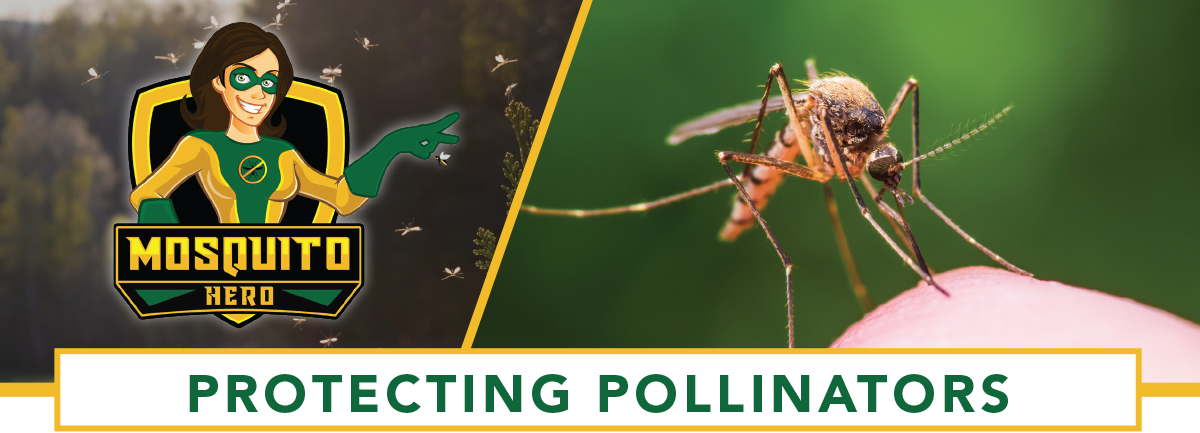Your Cart

Mosquito Hero’s Policy for Protecting Pollinators

Here at Mosquito Hero, we strive to be a friend to pollinators, and we’re so glad that you do too! While there are many factors that contribute to the loss of bees and other pollinators–including parasites, diet and nutrition, lack of genetic diversity, habitat loss, beekeeping management practices, weather, and viruses–we understand that pesticide use has been a focal point of concerns regarding pollinator decline. Rest assured that we are vitally interested in ensuring the health of pollinators and reducing any environmental impacts from our services. Out of an abundance of caution for the health of domestic or native bees and other pollinators, Mosquito Hero has a pollinator policy in place to guide our decision-making with regards to our products and how we use them.
Approved and Registered Products
Mosquito Hero only uses PMRA-registered pesticides that have gone through rigorous testing and risk assessment. When making decisions, the PMRA takes into account assessments of health risk, environmental risk, and value. Each of these three areas must be deemed acceptable before a pesticide can be registered. The PMRA provides a solid factual and contextual basis for making sound registration decisions that protect human health and the environment from unacceptable risks from pesticides. This means that products that are not effective do not have acceptable value and would therefore not be registered, even if the health and environmental risks were acceptable. Conversely, a product that is very efficacious and useful to an important commodity but poses environmental or health risks would also not be registered. The development of the feasible, required conditions of use is also a key aspect of assessing risk and value.
Mosquito Hero’s Best Practices
We are Alert to Blooming Plants
Before treating a landscape with an insecticide, we survey the property for the presence of flowering plants and weeds that are attractive to pollinators so we can avoid them when applying insecticide. Insecticides pose the greatest risks to pollinators when products are sprayed on plants that are attractive to pollinators while they are blooming.
Responsible use of Registered Products
Before using any pesticide, we always read the label and look for language regarding pollinators. PMRA-registered pesticides have specific language in their directions for use; some have a specific Pollinator Protection Box that points out important safety information for using the pesticide around pollinators.
We always read the pesticide label for insight on how dangerous a product is to pollinators. For pesticides that are hazardous to pollinators, we limit potential exposure by applying the product during times when the pollinators will not be attracted to them, before blooms develop or after petals fall. If products must be applied during a bloom, we do not apply directly to blooms to minimize pollinator exposure.
Mosquito Hero practices Integrated Pest Management (IPM), which is an ecosystem-based strategy that focuses on the long-term prevention of pests and pest-related damage through a combination of techniques, including surveillance, source reduction, control of all mosquito life stages, insecticide resistance testing, customer education, and evaluation of actions taken. When followed correctly, these methods are safe and have been scientifically proven to reduce mosquito populations, based on an understanding of mosquito biology and the mosquito life cycle.
Pesticides are used only after monitoring indicates they are needed according to established guidelines, and treatments are made with the goal of removing only the target organism. Pest control materials are selected and applied in a manner that minimizes risks to human health, beneficial and nontarget organisms like pollinators, and the environment.
The Truth About No Mow May
“No Mow May” is a trending initiative thought to provide food, habitats, and biodiversity for bees and other pollinators by–you guessed it–not mowing your lawn for the month of May. However, the reality is that letting your lawn and weeds grow long may not help the pollinators as much as we might hope. It will, however, provide cover for unwanted pests, such as rodents, ticks, and mosquitoes. Read How No Mow May Makes Habitats for Pests, and continue maintaining your lawn in a way that is sustainable and ecologically sound, including proper mowing, fertilizing, watering, and pest management practices.
 English (CANADA)
English (CANADA) English (USA)
English (USA)